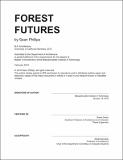Forest futures
Author(s)
Phillips, Sean, M. Arch Massachusetts Institute of Technology
DownloadFull printable version (67.32Mb)
Other Contributors
Massachusetts Institute of Technology. Department of Architecture.
Advisor
Rania Ghosn.
Terms of use
Metadata
Show full item recordAbstract
With recent interest in carbon emissions, wood has returned as a fashionable building material. Renewable, flexible, and a carbon sink, wood is increasingly seen as a material that responds to concerns of climate change. However, an acceptance of the Anthropocene demands a re-thinking of how humans relate to natural systems, and this thesis argues that with a return to wood, architecture must also return to its source - the forest - for inspiration and sites of intervention. This thesis sites itself within Mendocino National Forest in northern California. As sites of both extraction and conservation, National Forests are messy landscapes often overlooked in favor of their more manicured cousins, National Parks. National Forests are also under threat. Political hostility towards public land, drought, and wildfire threaten northern Californian forests more than ever before. 2017 - like 2015, 2012, 2006, and 2002 - has been the worst year on record for wildfire in California. National Forest budgets are increasingly consumed by fire suppression and - fueled by a changing climate and poor management - dangerous wildfires are the new normal for California. Fire, the great destroyer, is also a valuable ecosystem actor. Forest (and Californian) futures will depend on looking beyond the crisis of fire for opportunities within the fire cycle. This project proposes 'forest futures' in three chapters, each located at a point within the northern Californian mixed-conifer fire cycle - fighting fire, after the burn, and working with fire. Mendocino National Forest, even as the least visited in California, is filled with overlapping human and non-human worlds. Each chapter proposes an architectural intervention that engages the world of a forest dweller and their forest - the Conservation Tower, Burnout Lodge, and the Yule Tree Farm.
Description
Thesis: M. Arch., Massachusetts Institute of Technology, Department of Architecture, 2018. This electronic version was submitted by the student author. The certified thesis is available in the Institute Archives and Special Collections. Cataloged from student-submitted PDF version of thesis. Includes bibliographical references (page 141).
Date issued
2018Department
Massachusetts Institute of Technology. Department of ArchitecturePublisher
Massachusetts Institute of Technology
Keywords
Architecture.